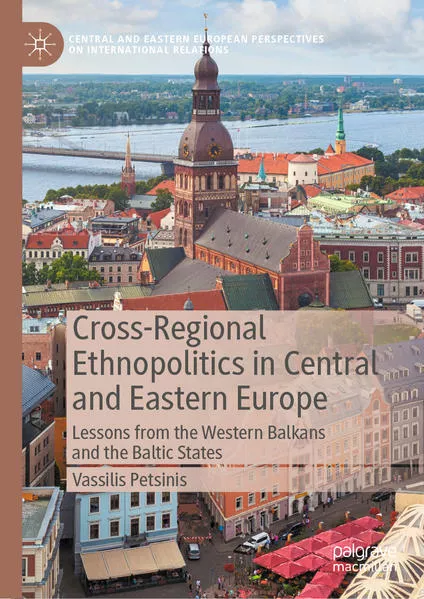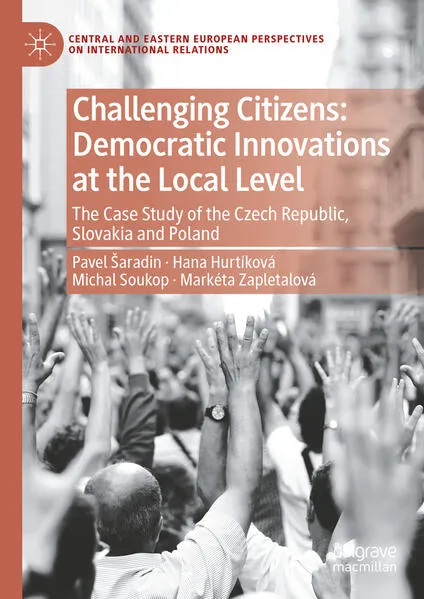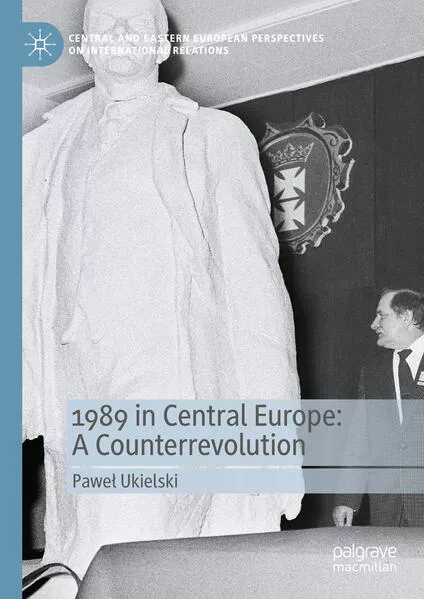Central and Eastern European Perspectives on International Relations
Cross-Regional Ethnopolitics in Central and Eastern Europe
Chronologie aller Bände (1 - 8)
Die Reihenfolge beginnt mit dem Buch "Cross-Regional Ethnopolitics in Central and Eastern Europe". Wer alle Bücher der Reihe nach lesen möchte, sollte mit diesem Band von Vassilis Petsinis beginnen. Der zweite Teil der Reihe "Cross-Regional Ethnopolitics in Central and Eastern Europe" ist am 18.04.2022 erschienen. Mit insgesamt 8 Bänden wurde die Reihe über einen Zeitraum von ungefähr 3 Jahren fortgesetzt. Der neueste Band trägt den Titel "Citizens and State Surveillance in Hungary and Romania".
- Anzahl der Bewertungen für die gesamte Reihe: 0
- Ø Bewertung der Reihe: 0
- Start der Reihe: 18.04.2022
- Neueste Folge: 01.05.2025
Diese Reihenfolge enthält 8 unterschiedliche Autoren.
- Autor: Petsinis, Vassilis
- Anzahl Bewertungen: 0
- Ø Bewertung:
- Medium: Buch
- Veröffentlicht: 19.04.2022
- Genre: Politik
Cross-Regional Ethnopolitics in Central and Eastern Europe
This book bridges the gap between academic researchers and policymaking experts working on the Western Balkans and those dealing with the Baltic States. Within the frame of a comparative and cross-regional approach, Vassilis Petsinis generates new insights in subjects as diverse as: how geopolitics shape the management of ethnic relations; the variants of Euroscepticism; opposition to immigration and LGBTQI rights; the patterns of multi-ethnic cohabitation; as well as the endeavour by parties of the populist and radical right to embed their platforms into the longer trajectories of ethno-nationalism in the countries and societies studied (Estonia and Latvia from the Baltic States; Croatia and Serbia from the Western Balkans). This work also assesses the extent to which the centrality of ethnic cleavages can be contested, temporarily effaced, or ultimately transformed by the increasing significance of the economy (social welfare and transparency) in multi-ethnic societies. The book adds a sound contribution towards updating and upgrading the study of ethnopolitics not solely across Central and Eastern Europe, but as a whole.
- Autor: Zuba, Krzysztof
- Anzahl Bewertungen: 0
- Ø Bewertung:
- Medium: Buch
- Veröffentlicht: 22.05.2023
- Genre: Politik
The Polish Delegation in the European Parliament
- Autor: Eberle, Jakub
- Anzahl Bewertungen: 0
- Ø Bewertung:
- Medium: Buch
- Veröffentlicht: 11.10.2023
- Genre: Politik
Politics of Hybrid Warfare
- Autor: Šaradín, Pavel
- Anzahl Bewertungen: 0
- Ø Bewertung:
- Medium: Buch
- Veröffentlicht: 13.11.2023
- Genre: Politik
Challenging Citizens: Democratic Innovations at the Local Level
- Autor: Kočan, Faris
- Anzahl Bewertungen: 0
- Ø Bewertung:
- Medium: Buch
- Veröffentlicht: 05.12.2023
- Genre: Politik
Identity, Ontological Security and Europeanisation in Republika Srpska
This book discusses the impact of the process of accession to the European Union (EU) – i.e. Europeanisation – on the formulation of the ethnic identity of Bosnian Serbs and the political identity of Republika Srpska (RS) in Bosnia and Herzegovina (BiH). The centrepiece of the book is an examination of how it is possible that the expected effect of Europeanisation on ethnic identities in a post-conflict environment – a transformation of ethnic identities through desecuritisation – does not materialise in the case of BiH and the RS. The book starts from the assumption that the political elite in the RS uses Europeanisation as a context for the securitization of two sources of threats – the internal and external Other. This prevents the transformation of ethnic identities in BiH, and as a result also the desecuritisation of antagonisms among the ethnic groups of BiH. The results show that any attempt at a more active engagement by the EU and international community was interpreted by the RS political elite as Bosniak agenda aimed against the RS. In this respect, the book demonstrates that BiH’s EU accession process or a clearer EU perspective alone in scrutinized critical junctures did not outweigh the potential costs for the RS political elite if reforms aimed at creating a more functional BiH were to succeed. In all three analysed critical junctures, the political elite in RS presented motions for a more functional BiH as attempts to centralise the country and framed them as the beginning of the end for the RS as a political entity.
- Autor: Ukielski, Paweł
- Anzahl Bewertungen: 0
- Ø Bewertung:
- Medium: Buch
- Veröffentlicht: 10.08.2024
- Genre: Politik
1989 in Central Europe: A Counterrevolution
The literature on the fall of communism contains numerous interpretations of the changes that took place in Central and Eastern Europe in 1989, while debates about how best to characterize the fall of the communist regimes have raged for many years. Researchers continue to ponder and argue over how ‘revolutionary’, as opposed to ‘evolutionary’ (or ‘reformatory’) these changes were. In this new study, author Paweł Ukielski proposes the term ‘counterrevolution’ to describe the historical process that took place and uses it as an analytical construct to better understand the crisis of Soviet communism and the subsequent transitions that took place.
- Autor: Vass, Martina
- Anzahl Bewertungen: 0
- Ø Bewertung:
- Medium: Buch
- Veröffentlicht: 04.02.2025
- Genre: Politik
Leadership Styles in the European Council
Using the example of Werner Faymann, Dalia Grybauskaité, Angela Merkel, Viktor Orbán and Mark Rutte, the book examines the impact that the European Council’s environment has on leadership styles and the impact of leaders on the institution’s decision-making during the financial and debt crisis, the Ukraine crisis, and the migration crisis (2010-2016). It presents domestic factors affecting the choice of leadership style nationally, finding cooperative styles are best suited to the European Council, as its structure relies on negotiated consensus. The European Council’s environment has three effects on leadership styles and decision-making: socialisation towards cooperation, compromise making, and Europeanisation. The book provides an in-depth insight into how leaders behave among their peers behind closed doors.
- Autor: Tap, Paul
- Anzahl Bewertungen: 0
- Ø Bewertung:
- Medium: Buch
- Veröffentlicht: 01.05.2025
- Genre: Politik
Citizens and State Surveillance in Hungary and Romania
This book explores the impact of personality traits on people’s acceptance of state surveillance used for national security purposes. So far, state surveillance has been analysed in relation to institutional factors, technological infrastructures or specific contexts. This book shifts the focus from institutional and systemic characteristics to individual traits. It shows the extent to which people’s personality traits explain the acceptance of state surveillance. The book provides a comparative analysis of Hungary and Romania to outline the differences between two former communist countries. The key results illustrate that highly conscientious people, those who are active in their communities, and the well-informed persons accept state surveillance more.







